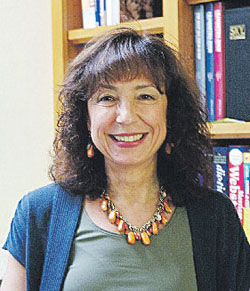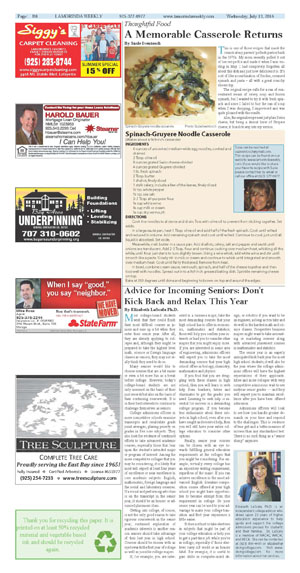| | Published July 13th, 2016
| Advice for Incoming Seniors: Don't Kick Back and Relax This Year
| | | By Elizabeth LaScala Ph.D. |  | | Elizabeth LaScala, Ph.D. is an independent college advisor who draws upon 25 years of higher education experience to help guide and support the college admissions process for students and their families. Dr. LaScala is a member of NACAC, WACAC and HECA. She can be contacted at (925) 891-4491 or elizabeth@doingcollege.com. Visit www.doingcollege.com for more information about her services. |
Most college-bound students wish that they could finish their most difficult courses as juniors and ease up a bit when they enter their senior year. After all, they are already applying to colleges and, although they might be prepared to take the highest level math, science or foreign language classes as seniors, they may not really think they need to do so.
 Many seniors would like to choose courses that are a bit easier or even a bit more fun as a break before college. However, today's college-bound students are not only assessed on the basis of their past records but also on the basis of their continuing coursework. It is in their best interests to continue to challenge themselves as seniors.
Many seniors would like to choose courses that are a bit easier or even a bit more fun as a break before college. However, today's college-bound students are not only assessed on the basis of their past records but also on the basis of their continuing coursework. It is in their best interests to continue to challenge themselves as seniors.
 College admissions officers in more competitive schools examine transcripts and recalculate grade point averages, placing priority on grades in five core subjects. They also look for evidence of continued efforts to take advanced academic courses, especially those that bear upon the student's intended major or program of interest. Among the more competitive colleges that you may be considering, it is likely that most will expect at least four years of excellence or near excellence in core academic subjects: English, mathematics, foreign language and the social and laboratory sciences. If a visual and performing arts class is on the transcript in the senior year, it should be an honors or advanced placement class.
College admissions officers in more competitive schools examine transcripts and recalculate grade point averages, placing priority on grades in five core subjects. They also look for evidence of continued efforts to take advanced academic courses, especially those that bear upon the student's intended major or program of interest. Among the more competitive colleges that you may be considering, it is likely that most will expect at least four years of excellence or near excellence in core academic subjects: English, mathematics, foreign language and the social and laboratory sciences. If a visual and performing arts class is on the transcript in the senior year, it should be an honors or advanced placement class.
 Getting into college, of course, is not the only good reason to take rigorous coursework in the senior year; continued exploration of academic interests is another reason seniors should take advantage of their last year in high school. Courses should be chosen with an eye towards the first year of college as well as possible college majors.
Getting into college, of course, is not the only good reason to take rigorous coursework in the senior year; continued exploration of academic interests is another reason seniors should take advantage of their last year in high school. Courses should be chosen with an eye towards the first year of college as well as possible college majors.
 If, for example, you are interested in a business major, take the most demanding courses that your high school has to offer in economics, mathematics and statistics; those will help you confirm your interests or lead you to consider other majors that you might enjoy more. If you are interested in some area of engineering, admissions officers will expect you to take the most demanding courses that your high school offers in biology, chemistry, mathematics and physics.
If, for example, you are interested in a business major, take the most demanding courses that your high school has to offer in economics, mathematics and statistics; those will help you confirm your interests or lead you to consider other majors that you might enjoy more. If you are interested in some area of engineering, admissions officers will expect you to take the most demanding courses that your high school offers in biology, chemistry, mathematics and physics.
 If you find that you are struggling with these classes in high school, then you will learn to seek help from teachers, tutors and classmates to get the grades you need. Learning to seek help is essential for success in a demanding college program. If you become less enthusiastic about these subjects in high school, even after you have sought and received help, then you will still have your entire college education to consider other options.
If you find that you are struggling with these classes in high school, then you will learn to seek help from teachers, tutors and classmates to get the grades you need. Learning to seek help is essential for success in a demanding college program. If you become less enthusiastic about these subjects in high school, even after you have sought and received help, then you will still have your entire college education to consider other options.
 Finally, senior year courses can be chosen with an eye towards fulfilling general education requirements at the colleges that you might be considering. For example, virtually every college has an expository writing requirement, regardless of the major. If you can achieve excellence in the most advanced English literature-composition course offered at your high school you might have opportunities to become exempt from this requirement in college. So your senior year can be used to your advantage to make your college transition and first year experience a little easier.
Finally, senior year courses can be chosen with an eye towards fulfilling general education requirements at the colleges that you might be considering. For example, virtually every college has an expository writing requirement, regardless of the major. If you can achieve excellence in the most advanced English literature-composition course offered at your high school you might have opportunities to become exempt from this requirement in college. So your senior year can be used to your advantage to make your college transition and first year experience a little easier.
 It does not hurt to take electives in subjects that might be part of your college education or help you to get a part-time job while you're in college, especially if those electives carry AP credit or an honors label. For example, it is useful to gain skills in computer-aided design, or robotics if you want to be an engineer, as long as you take and do well in the hardest math and science classes. Prospective business majors might want to take accounting or marketing courses along with advanced placement courses in mathematics and statistics.
It does not hurt to take electives in subjects that might be part of your college education or help you to get a part-time job while you're in college, especially if those electives carry AP credit or an honors label. For example, it is useful to gain skills in computer-aided design, or robotics if you want to be an engineer, as long as you take and do well in the hardest math and science classes. Prospective business majors might want to take accounting or marketing courses along with advanced placement courses in mathematics and statistics.
 The senior year is an eagerly anticipated kick back year for most high school students; it will also be the year where the college admissions offices will have the highest expectations of their applicants. More and more colleges with very competitive admissions wait to see midyear senior grades - and they will expect you to maintain excellence after you have been offered admission.
The senior year is an eagerly anticipated kick back year for most high school students; it will also be the year where the college admissions offices will have the highest expectations of their applicants. More and more colleges with very competitive admissions wait to see midyear senior grades - and they will expect you to maintain excellence after you have been offered admission.
 Admissions officers will look to see how you handle greater demands on your time and respond to the challenges. This is evidence of true grit and a better measure of success than any standardized test. There is no such thing as a "senior slump" anymore.
Admissions officers will look to see how you handle greater demands on your time and respond to the challenges. This is evidence of true grit and a better measure of success than any standardized test. There is no such thing as a "senior slump" anymore.


|
| | | | | | | | | | | | |



